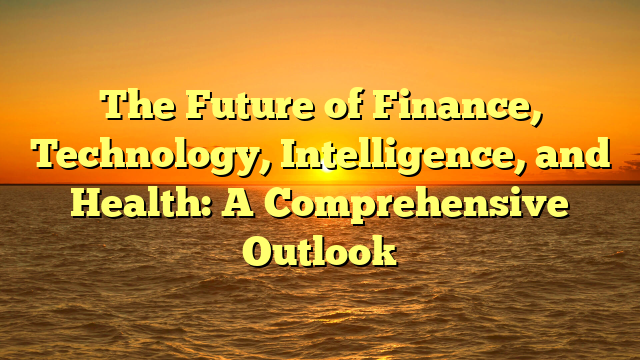—
Finance, technology, intelligence, and health are not just isolated sectors—they are deeply intertwined, influencing each other in ways that shape the future. The integration of these domains is a catalyst for change, and their development is essential for a sustainable future. In this article, we delve into how these four areas are progressing and converging, exploring their mutual influence.
Finance: The Changing Landscape of Global Economies
Finance has experienced profound shifts over the last few years. Technological advancements such as blockchain, digital currencies, and AI-driven analytics have disrupted traditional financial systems. Decentralized finance (DeFi) has emerged as a powerful force, offering new ways for individuals and institutions to access financial services and invest in global markets.
Moreover, financial technology (fintech) is revolutionizing the way we interact with money. Online banking, mobile payment systems, and peer-to-peer lending platforms have made financial services more accessible than ever. These advancements have led to the rise of digital banks, which operate without the need for physical branches. Additionally, slot gacor resmi of investment through apps like Robinhood has made stock trading more accessible to the general public.
Technology: The Catalyst for Change
Technology is at the core of progress in finance, intelligence, and health. The application of AI, machine learning, and data analytics is transforming the way industries operate. In finance, technology is enhancing risk management, improving decision-making, and fostering innovation. Healthcare is experiencing a similar transformation, with AI being used to optimize patient care and predict outcomes. The influence of technology continues to expand, reshaping nearly every aspect of society.
Cloud computing has further accelerated technological advancements across sectors. With the ability to store vast amounts of data and run complex algorithms, cloud platforms are becoming indispensable in finance and healthcare. For example, in finance, cloud-based platforms help streamline transactions and secure sensitive data. In healthcare, cloud-based tools enable the efficient management of medical information, promoting better care coordination.
Intelligence: The Role of Artificial Intelligence in Shaping the Future
Artificial intelligence (AI) is rapidly changing the landscape of multiple industries, including finance, healthcare, and beyond. In finance, AI is used to optimize investments, identify market patterns, and reduce human error. In healthcare, AI-powered tools are improving diagnostic accuracy and enabling personalized treatments that are tailored to a patient’s unique genetic profile. The integration of AI into these fields is enhancing both efficiency and outcomes.
The rise of AI brings both exciting opportunities and serious challenges. On one hand, AI can enhance efficiency and productivity in finance, healthcare, and many other industries. On the other hand, ethical issues such as privacy concerns, algorithmic biases, and the potential loss of jobs due to automation must be carefully managed. Developing a responsible framework for AI adoption is essential to maximizing its benefits while minimizing its risks.
Health: The Intersection of Technology and Well-being
Health and technology are increasingly intertwined, particularly in the realms of personalized medicine and wellness. Advances in genetic research, along with the use of AI and big data, are enabling more personalized and targeted treatments. Precision medicine, which tailors medical treatments to individuals based on their genetic information, is becoming a reality. Additionally, wearable health devices like smartwatches and fitness trackers are helping individuals monitor their health in real-time, providing valuable insights into their physical well-being.
The integration of telemedicine has been a game-changer in improving healthcare delivery. Especially during the COVID-19 pandemic, virtual consultations became a vital tool for connecting patients with doctors. Telemedicine offers convenience and accessibility, particularly for those who live in underserved areas or have mobility challenges. With the growing use of telehealth platforms, healthcare is becoming more efficient and easier to access.
—
To conclude, the ongoing developments in finance, technology, intelligence, and healthcare will have a transformative impact on society. As these fields continue to progress, their interconnectedness will lead to more efficient, personalized, and accessible services. The future is bright, with endless possibilities for how these domains will contribute to a healthier, more sustainable world.
